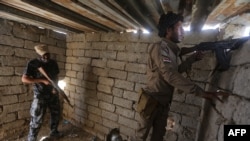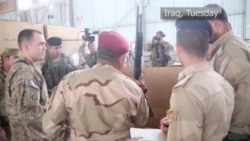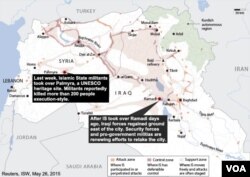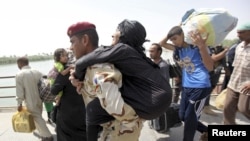Iraqi government-allied forces clashed with Islamic State militants on the edges of Ramadi after Baghdad launched an offensive Tuesday to retake Anbar province and its capital.
The U.S. military endorsed Iraq’s decision, announced earlier Tuesday. Ramadi, a predominantly Sunni city, fell to the Islamic extremist group May 17 after Iraq’s military fled.
Iraqi sources say the offensive is backed by Shi'ite militias as well as Sunni pro-government fighters.
The U.S. military welcomed the Sunnis’ inclusion, said Colonel Steve Warren, Pentagon spokesman.
"We've long said that the key to victory, the key to expelling ISIL from Iraq, is a unified Iraq … that separates itself from sectarian divides, coalesces around this common threat," Warren said at a briefing Tuesday.
The regular Iraqi military's failure to hold Ramadi has forced the government to send Iran-backed Shi'ite paramilitaries to help retake the city. Washington has worried this could enrage residents in the overwhelmingly Sunni province and push them into the arms of the Islamic State group.
But on Tuesday, Shi’ite militiamen, supported by a smaller cadre of government troops, had advanced to within a few kilometers of a university of Ramadi’s southwestern edge – part of the "shaping operations" of a proper offensive, Warren said.
"Shaping operations in this case are operations in order to secure lines of communication, secure key road junctures and intersections, secure certain terrain ... prior to a full-on offensive," the Pentagon spokesman said.
Later Tuesday, Anbar province officials reported fighting and airstrikes west and south of Ramadi, according to the Associated Press. Iraqi media reported shelling and minor clashes between government-allied forces and Islamic State militants.
The fight against the Islamic State continued on multiple fronts. The Pentagon reported that, over a 24-hour period ending Tuesday, a U.S.-led coalition had coordinated 19 airstrikes against IS targets in Iraq and Syria. Twelve were near the Iraqi cities of Beiji, Fallujah, Hit, Mosul, Sinjar and Tal Afar, while seven were focused near Al Hasakah, Syria.
Watch video of President Obama discussing challenges
Hours after Baghdad announced its campaign, President Barack Obama said the United States and its NATO allies need to consider how they are deploying military assets against Islamist extremists in Iraq.
Obama, speaking at the end of a meeting with visiting NATO Secretary-General Jens Stoltenberg, said the challenge posed by the Islamic State group in Iraq and Syria, and the conflict in Libya, has forced the alliance to look south as well as east in its mission.
"NATO is necessarily recognizing a whole range of global challenges, particularly on what we call the Southern Front ... making sure that we continue to coordinate effectively in the fight against ISIL," Obama said, using an acronym for the Islamist group. "It also means we have to think about whether we are deploying and arranging our assets effectively to meet that challenge."
On Sunday, Pentagon chief Ashton Carter had criticized Iraqi forces for pulling out of Ramadi without much fight.
Warren elaborated on those remarks Tuesday, noting that the Iraqi forces "vastly outnumbered their enemy yet they chose to withdraw."
WATCH: U.S.-led coalition forces supply new weapons to Iraqi forces preparing to retake Islamic State-held city of Mosul
Problems underlying Ramadi
Warren cited a host of problems that preceded the Iraqi pullout from Ramadi. "Their morale had slipped, their leadership was not up to par. They believed that they were not receiving the support that they thought they needed," he said.
Officials attribute Ramadi’s fall to at least two other factors: a breakdown in communication among the Iraqis concerning airstrike capabilities, plus massive bombings by the Islamic State that took out entire city blocks.
The Pentagon assured VOA that it is working with the Iraqi government to improve command-and-control communications. It also said it would provide about anti-tank rockets to Iraq "within the next week."
Warren said it was reasonable to start the Anbar offensive even before delivery of the anti-armor weapons, also called AT-4s. “Every day the enemy has in Ramadi is another day for the enemy to harden and to develop [its] defenses," he explained.
The Pentagon spokesman also said U.S. forces have trained 7,000 Iraqis to help with anti-Islamic State offensives across Iraq. But he warned these forces are not going to immediately turn the tide. The fight to push the militants out of Iraq is expected to take years.
Iraqi Prime Minister Haider al-Abadi told the BBC that Ramadi would be retaken in days, and that he had confidence in the ability of Iraqi forces.
Sectarian and political divisions, however, have posed ongoing problems.
According to Iraqi reports, some of the Shi'ite militias involved in the fighting have chosen a sectarian name for their Anbar campaign: "Labaik Ya Hussein,'' Arabic for “I am here for you, Hussein.” It refers to a grandson of the Prophet Muhammad who was killed in a seventh-century battle and today remains one of the most revered figures of Shi'ite Islam.
Warren criticized the name choice. "I think it’s unhelpful," he said.
Syria
Syrian activists said the Islamic State-held town of Palmyra was quiet a day after a series of deadly Syrian government air raids that killed 15 people, including a child and two women, in and around the city. The raids came after the government told the AP that Islamic State fighters have killed more than 400 state employees, soldiers and pro-government gunmen since capturing the town last week.
Maamoun Abdulkarim, Syria's antiquities chief, said Tuesday the historical ruins at Palmyra, home to a UNESCO World Heritage site, had been unharmed since the Islamic State group seized it from state control last week. However, he said he still feared the jihadist group would blow up ancient ruins, including tombs and the Temple of Bel, which would be viewed as idolatrous in its puritanical vision of Islam.
Also Tuesday, a video released by the pro-Islamic State Aamaq News Agency, media arm of the Islamic State group, purportedly shows the archaeological ruins of Palmyra undamaged but with black smoke billowing behind the ruins.
Reuters could not independently verify the video source.
Edward Yeranian contributed to this report from Cairo. Some material for this report came from Reuters and AP.









